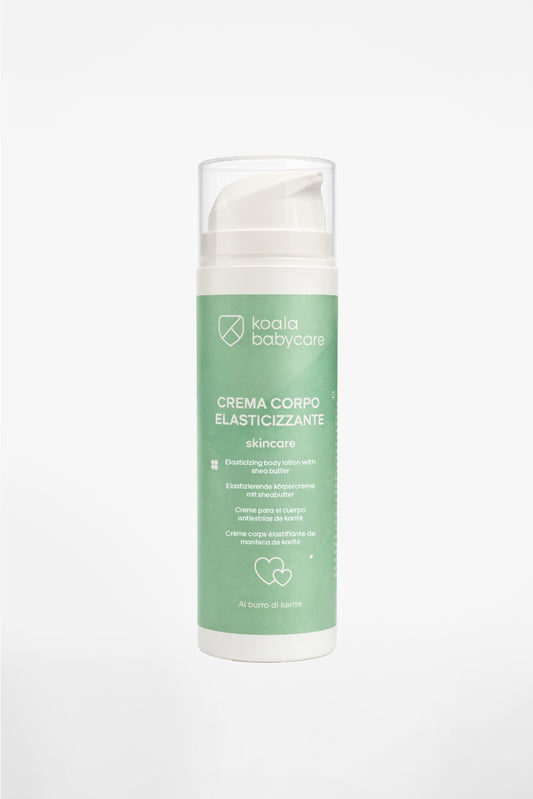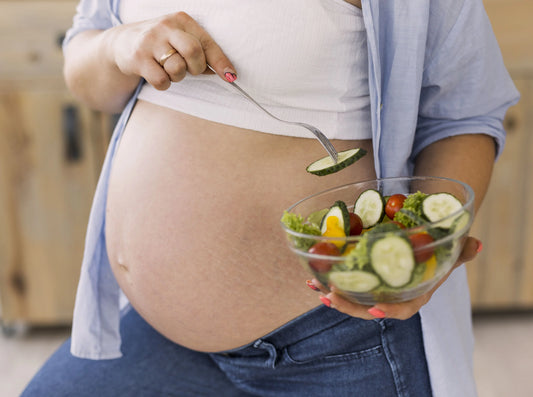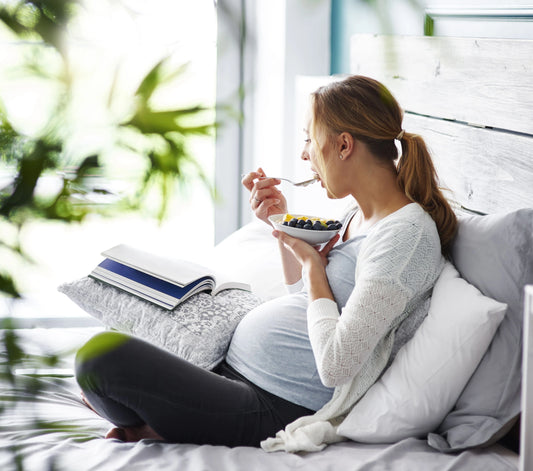While pregnant you need to pay particular attention to your diet. There are certain foods you should avoid as they can present a possible risk to your unborn baby, and other food that should only be consumed in moderation.
Likewise, it’s important to eat a healthy diet, as this doesn’t only lessen complications during pregnancy and the birth, but also reduces the possibility of the baby developing chronic diseases, such as diabetes and hypertension.
What diet should I follow during pregnancy, and, most importantly, which foods are considered “forbidden” during pregnancy? Read on to find out more.
A healthy pregnancy diet: what to eat?
Vegetables, proteins, carbohydrates, fruit: these nutrients are an essential part of our daily diet. What about the quantities?
Plenty of fruit and vegetables, including nuts such as walnuts and almonds.
Carbohydrates are a must, preferably complex and wholegrain such as wholewheat bread, brown rice, wholewheat pasta, and potatoes. Pulses such as chickpeas, beans, lentils, and peas are also very good.
You can eat fish. However, meat, eggs and cheese should be eaten in moderation.
Throughout pregnancy, mums-to-be can experience nausea and slower digestion, resulting in reflux. To ensure you consume the right amount of calories, we recommend having lighter meals and avoiding heavy foods such as hot, spicy, fried foods.
The complete list of foods to avoid during pregnancy
During pregnancy, certain foods should be avoided as they can present health risks for the unborn baby, such as Toxoplasmosis, Listeriosis and Salmonellosis.
We will review each one later in more detail, but here is a useful list:
- Fruit and vegetables which haven’t been washed carefully
- Raw or undercooked eggs: such as fried, soft-boiled or poached eggs; and creams and sauces made from raw eggs, such as homemade mayonnaise, tiramisu, and vitel tonné.
- Raw or undercooked fish and meat: such as sushi, carpaccio, cured meats, uncooked marinated fish.
- Smoked fish
- Raw mushrooms
- Soft, semi-soft and blue cheeses: such as Brie, Camembert, Gorgonzola
- Alcohol
Foods which should be eaten in moderation
There are some other foods we need to add to the “foods to avoid” list, which are not harmful as such but only as long as they are consumed in moderation.
- Added sugars, such as snacks, ice cream, soft drinks, and juices.
- Table salt, which should be replaced with iodized salt.
- Caffeine and teas, which should be limited to once or twice a day.
- Fried and fatty foods, which are not healthy for mother or baby.
- Citrus fruits, tomatoes, and spicy foods, which are not easy to digest.
Cheeses to avoid during pregnancy
Let’s start with one of the trickiest foods: it can be hard to understand which type of cheese can be eaten and which not.
Let's start with unpasteurised raw milk which is harmful during pregnancy as it can lead to Salmonella, Listeriosis and Escherichia coli. Consequently, the same applies to soft, uncooked cheeses made from unpasteurised milk.
We are talking about:
- Brie
- Camembert
- Gorgonzola
- Taleggio
- Danish Blue
- Roquefort
Matured cheeses, on the other hand, do not allow pathogens to develop. Therefore, the following dairy products can be consumed without any problem:
- Parmesan
- Grana Padano
- Ricotta
- Mozzarella
- Feta
- Spreadable creams
- Yogurt
- Cream
- Pasteurized milk
Fruit and Vegetables
During pregnancy fruit and vegetables can be eaten in large quantities as long as they have been washed well with baking soda or food chlorine. Otherwise, they can lead to Toxoplasma, Norovirus, Hepatitis A and Listeriosis.
Which ones should we be especially careful of?
- Strawberries: as they are immersed in soil, they should be washed particularly well.
- Rocket salad: the shape of its leaves mean it is particularly suited to hosting micro-organisms.
- Eating out: as you can never be sure how thoroughly fruit and vegetables have been washed.
Meat during pregnancy
Meat is good for you during pregnancy and should not be removed from your diet. However, you should avoid raw and undercooked meat, such as:
- Cold cured meats, such as, parma ham (prosciutto), pancetta, speck, pepperoni, chorizo, salami
- Lightly matured Salami meats (less than 30 days)
- Steak Tartare (raw minced beef dish)
- Rare or undercooked steak and meat
- Smoked meat, such as Bresaola and salt-cured meat
- Hotdogs, due to the low meat quality
The risk is related to you contracting Toxoplasmosis, Listeriosis, Salmonella, Campylobacter, or Escherichia coli.
The following cold cooked meats can be eaten without a problem:
- Cold cooked sliced meats (ham, turkey, and chicken)
- Mortadella
- Porchetta
However, it is best to avoid buying these sliced meats at the deli counter to reduce the risk of possible contamination from other cured meats. It is advised to buy pre-packed meats.
Eggs and egg-based foods
Raw or undercooked eggs can cause Salmonella. You should avoid:
- Custard-like desserts (containing raw egg)
- Fried and poached eggs
- Soft-boiled eggs
- Home-made mayonnaise
- Tiramisu
- Vitel Tonné
Well-cooked eggs and processed products, such as shop bought mayonnaise, can be eaten freely.
Fish during pregnancy
It is very important to ensure any fish or seafood you consume during pregnancy is well-cooked. Otherwise, you risk contracting Norovirus, Hepatitis A Virus, Listeriosis, Campylobacter, Salmonella and Escherichia Coli.
Therefore, you should avoid:
- Raw fish or seafood (such as, Carpaccio, Tartare, Ceviche)
- Undercooked fish or seafood
- Sushi and sashimi
- Marinated raw fish
- Smoked fish
Smoked fish
Not many people know that smoked fish is also considered raw and should therefore be avoided when expecting a baby. The process of smoking fish is not sufficient to reduce the risk of contamination.
Sushi during pregnancy
In reality, fish that has been thermally culled, i.e., frozen for at least 96 hours at -18°, and then kept under perfect hygienic conditions, as all Sushi restaurants should do, is free of parasites and therefore considered harmless.
However, since we are unable to be 100% sure that such standards have been respected, it is advised to avoid eating Sushi when pregnant.
Mushrooms
Mushrooms absorb particles and micro-organisms, so it is always best to ensure they have been cooked through before eating.
Raw sprouts
Raw sprouts such as sunflower, sesame, flax, soya and alfalfa are rich in vitamins and can usually be eaten raw. However, they are not advised during pregnancy as they can contain pathogens which can cause Salmonella.
Alcohol
There are currently no studies which scientifically provide an indication to the limit of alcohol below which no harm is caused to the foetus. Therefore, it’s advised to avoid alcohol completely during pregnancy, (including a glass of glass of wine).
Caffeine
If consumed in high doses, caffeine may have adverse effects on the foetus. This does not mean that you cannot drink coffee in the morning or after lunch, but you should reduce the amount. Remember that tea and cola also contain caffeine.
Sugary foods during pregnancy
Generally speaking, added sugars should be consumed in moderation, and even more so during pregnancy. It's fine to indulge in a sweet treat now and again, but don't overdo it.
Too much sugar increases the risk of gestational diabetes, pre-eclampsia, and postpartum haemorrhage.
Desserts made with raw eggs, such as tiramisu and certain custard style puddings, should not be eaten during pregnancy, even in small quantities, due to the risk of Salmonella.
Ice cream
Ice cream is the same as desserts: you can eat it as long as you don't overdo it. However, there are two different aspects to note:
- Homemade ice cream should be avoided if it is made from raw unpasteurized milk.
- It’s best to avoid choosing fruit flavours, as we cannot be sure that the fruit has been washed properly.
Fizzy and sugary drinks
Iced tea, fizzy drinks, cola, and fruit juices contain large quantities of sugar. So, they should only be consumed occasionally, just like sugary foods (however, no need to avoid them completely).
Spicy food during pregnancy
Do you love spicy food but are unsure whether you need to give it up while you’re pregnant?
You can continue to use spices such as curry and ginger, just as long as you don't overdo the quantities.
Pepper and chilli pepper do not pose any risk and also have a number of beneficial properties: they stimulate blood circulation, have antibacterial properties and are rich in vitamin C.
Spices and spicy foods should be avoided if you suffer from haemorrhoids and digestive problems, as can often happen towards the end of pregnancy. Otherwise, there is no issue.
This list of foods to avoid during pregnancy may seem extensive. However, don’t worry, in reality you’ll find that there are still lots of yummy foods you can enjoy.
Pregnant women often suffer from a significant increase in appetite. This can make the temptation to indulge in sweet treats and fatty foods even greater. The secret to resisting? Remove snacks and crisps from your kitchen cupboards, replacing them with healthy snacks and vegetables. That way you can eat food which is good for both you and your baby!








